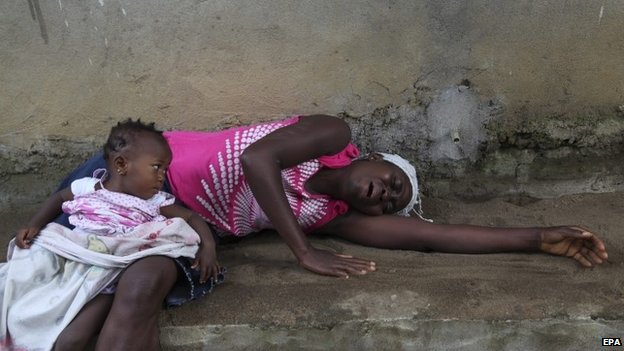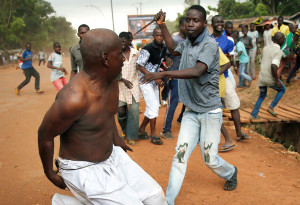By Ashley Repp
Impunity Watch Reporter, Africa
MONROVIA, Liberia- The fight to stop the spread of the deadly Ebola virus has been unsuccessful; the death toll has risen, as well as the number of those infected. People in Liberia, an epicenter of the disease, have struggled to cope with the existence of Ebola within their country’s borders. Some are convinced that saying the word “ebola,” will bring the virus to the village. Others believe that it is nothing but a government hoax to get peoples’ blood. And some are consumed by fear, skeptical of medical personnels’ ability to help stop the virus as more and more people taken into hospitals for treatment never emerge. This fear has caused many people to hide in their homes when they become ill, relying on their family for care, and infecting them in the process. But one of the newest issues in grappling with this virus, are the containment methods being employed to stop the virus.

In West Point slum in Monrovia, residents are being detained by police. No one is allowed in or out. Barbed wire lines gaps between buildings and officials stand ready to enforce. As a result of this confinement, people are unable to go to work, unable to feed themselves or their families, and the formerly minimal sanitation is now nonexistent. These quarantine policies have done nothing to quell fear, and instead, have provoked panic and desperation in an already tense community, rattled by the Ebola crisis. One man interviewed from the other side of a quarantine gate in the slum likened the containment process to being penned up like an animal. Others have expressed concern over the fact that the dead are not necessarily getting proper burial rites, according to local and religious practices and beliefs. For example, one man interviewed asserted that among the dead was a Muslim man, and particular burial practices must be followed.
While there is an apparent need to contain the virus, and quickly, the quarantine practices walk the line of inhumane, even under the given circumstances. Effective communication lines need to be formed between medical workers and villages so that the fear many have of doctors, nurses, and hospitals can be eliminated. But with the limited resources at government and aid groups’ disposal, the battle to contain the spread of Ebola will be challenging. Educating people as quickly as possible on the spread of the virus and the role of doctors may be the best low budget and most effective method of containment.
For more information please see:
The New York Times- What you need to know about the Ebola outbreak– 22 Sep 2014
PBS- Frontline: Ebola Outbreak (Documentary)– 9 Sep 2014
Discovery Health Channel- Ebola: Inside the deadly outbreak (Documentary)– 2014
CNN- Angry, scared and hungry: inside the Ebola quarantine zone– 26 Aug 2014



